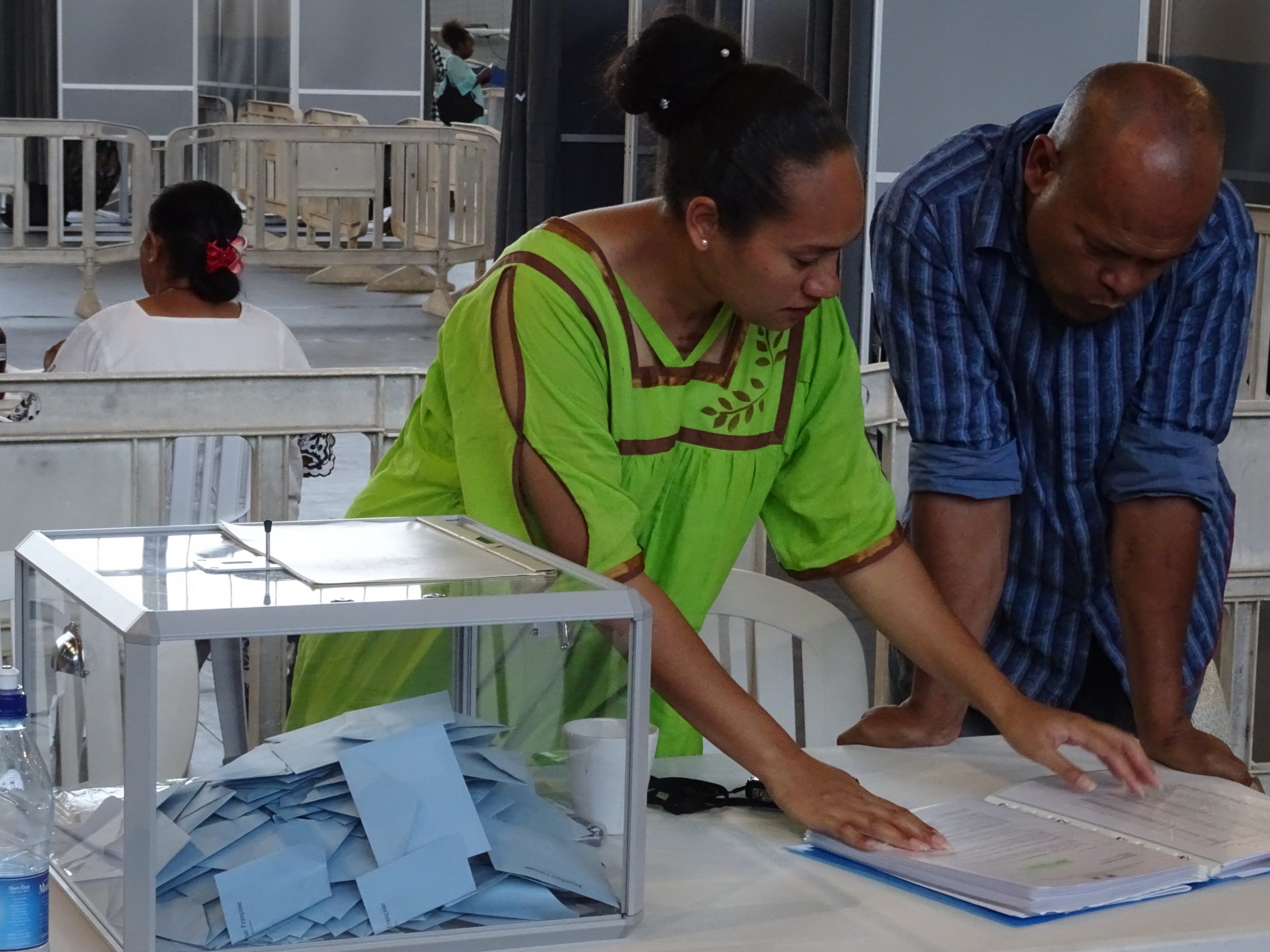By Nic Maclellan in Noumea, New Caledonia
Voters in New Caledonia have voted against independence in Sunday’s referendum on self-determination. Turning out in unprecedented numbers, a majority of voters decided to stay within the French Republic. However the vote for independence was much stronger than predicted by recent opinion polling and in campaign statements from leading anti-independence politicians.
More than 174,000 people were asked to vote on the question: “Do you want New Caledonia to accede to full sovereignty and become independent?”
At close of counting on Sunday night, unofficial results show 43.6 voted Yes for independence while 56.4 voted to stay within the French Republic.
With final counts re-confirmed overnight, the formal results will be announced on Monday morning (Noumea time) by Francis Lamy, the President of the Control Commission established by the French government to administer the vote.
There were significant differences across the country, with 75.8 per cent voting Yes in the Northern Province and 82.1 per cent Yes in the Loyalty Islands Province, two regions where the majority of the population are indigenous Kanak.
In contrast, the larger Southern Province, with a majority non-Kanak electorate, voted strongly 73.71 per cent to stay with France, with only 26.29 per cent of southern voters opting for independence.
Turnout varied across the country, but there was an unprecedented, strong mobilisation in many areas. By 12 noon on Sunday, 41.81 per cent of registered voters had gone to the polls (in comparison, during the 2014 local elections, 27.27 per cent had voted by midday). By 5pm on Sunday, the turnout had increased to 73.68 per cent.
At close of counting on Sunday night, the overall turnout was more than 80 per cent, based on 86 per cent participation in the North, 83 per cent in the South, but only 58.8 per cent in the outlying Loyalty Islands.
Differing reasons
In Noumea, voters lined up at schools, town halls and other polling locations across the capital. People from the outlying island groups who could not afford to travel to their home island voted at a special voting centre at a sporting complex in the inner-city suburb of Valee du Tir.
Talking to people as they exited the booths, it was clear that that there were significant differences between Kanak and non-Kanak voters, and between younger and older voters.
In polling booths in the wealthy beachside suburb of Anse Vata, the voters – mainly European – were concerned about their future. In exit-poll interviews, “stability” and “security” were words that recurred again and again. An elderly couple was worried about the quality of the health system in an independent state, a school teacher about the quality of education: “We’ve made great advances in the last twenty years – we no longer teach the kids about Charlemagne and the Gauls. But we shouldn’t throw this away by choosing independence.”
Another woman said: “We’re a small country and we need protection. We have great wealth with our nickel, and many countries are eyeing our wealth.”
One woman in Anse Vata was reluctant to lose access to the European Union provided by a French passport (“we’re French after all”), while another said simply: “I want to stay within the French Republic. That’s all.”
In the working class suburb of Riviere Salee, there were mixed reactions. One Tahitian man, joined by his son who was voting for the first time, said he was open to independence in the future, but not now: “We’re not ready. The FLNKS has failed to do the work needed to persuade people about how they’ll pay for the future.”
In contrast, a number of Kanak voters were clear in their support for the Yes campaign. One women told me: “I’m voting for independence, for the future of my country, of our identity.” Would the young people turn out to vote? “I truly think the young will vote today. They too know what this is about.”
Another young Kanak woman, turned away from the booth and redirected to another polling station, said simply: “I will vote Yes for my country.”
French reaction
Speaking from Paris after the counting of votes, French President Emmanuel Macron welcomed the decision of New Caledonian voters, stating “there is no other path than that of dialogue.”
Despite the French State’s ongoing strategic interests in the South Pacific, Macron presented the French government as a “strictly neutral” partner in the referendum. He highlighted the “transparency and sincerity” of the referendum process, noting the presence of observers from the United Nations and neighbouring Pacific countries.\
French Prime Minister Edouard Philippe arrives in Noumea on Monday morning, to spend the day meeting with political leaders and French officials, in order to gauge the reactions of competing parties in New Caledonia and encourage calm over the next six months (New Caledonians go to the polls in May 2019, to elect representatives to the three Provincial assemblies and national Congress.)
In a gesture showing their ongoing determination to continue the independence struggle, two key independence leaders may not travel to Noumea to meet the Prime Minister during his lightening visit to the French Pacific dependency. Instead, Edouard Philippe is scheduled to fly north to the northern provincial capital of Koohne, to meet Daniel Goa, president of Union Calédonienne (UC) and Paul Neaoutyine, president of the Parti de Liberation Kanak (Palika).
Prime Minister Philippe will present the French government’s reaction to the referendum in a televised interview before he flies out of New Caledonia on Monday night.
[Islands Business and Pacnews will continue reporting from New Caledonia in coming days, with updates and analysis from different political leaders.]
